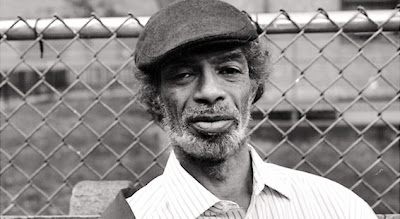"He was Breaking Shit Down": Remembering Gil Scott Heron
by Adam Mansbach | Special to NewBlackMan
I’ve known for fifteen minutes now that Gil Scott-Heron is gone. Time enough to play “Winter in America” and “Pieces of a Man,” and to cry, and for the belief that his death is among the greatest tragedies I’ve ever known to harden inside me. That probably sounds ridiculous, and perhaps it is. Certainly, Gil died in slow motion: there is nothing to be surprised at here, no sudden violence ripping apart the fabric of a life. But the fact remains: the most incisive and salient political musician this country has ever produced – ever – is gone.
The fact that drugs took him under – and I don’t mean today, I mean over and over again ¬– makes it worse; makes me angry in a diffuse, perhaps unreasonable way: leads me into thought-rants like if he’d been acknowledged as the national treasure he was, if they (“they”) had given him a fucking MacArthur, then at least he would’ve been one of those enough-money-to-function drug addicts, and he’d be with us still, shadow-version of himself or not.
But all that is beside the point. First things first, the depth and scope of Gil Scott-Heron’s musical-political content is beyond compare. Nothing and nobody comes close: not Bob Dylan, not KRS-One, nobody. During the prime of his career (1970-1984), he was out in front on practically every major political issue – not just nationally, but globally. His commentary was incisive, nuanced, hilarious, and routinely prescient. He carved up the entire Nixon administration with a stainless steel scalpel, psychoanalyzed Reagan and Reagan-happy America better than anybody else I can think of. Challenged the South African government, clarioned the dangers of nuclear power, called out racist cops. Did environmentalism is the early seventies. Gun control in 1980. The Iranian Revolution, the No-Knock Law. Abortion.
And that’s just his topical shit; it’s harder to say what “Ain’t No Such Thing As Superman” or “Winter in America” is about… unless you just cut to the chase and start throwing around words like “zeitgeist,” or phrases like “the troubled soul of America.” And if Gil didn’t invent the pointedly-absurdist extended-free-associative-pop-culture riff, he certainly perfected it in his most famous song.
But none of that even get at his greatness, or at least not fully. The flipside of Gil’s panoramic political worldview was the depth of his self-analysis, the delicacy of his portraiture: for every world-shaking anthem, every “Johannesburg,” there is another song buried deeper in his catalogue, one that charts the quietest, most intimate of blues moments with sublime beauty, raw honesty, unfettered emotion.
I met Gil in 1994, when I was seventeen and he was touring behind the release of his first new album in a decade. Went to check him at Regattabar in Cambridge, and rushed him afterward, a sheaf of my own poems in hand. He didn’t break his stride – clearly, the man had somewhere to be – but he did take them. Several hours later, well past midnight, my phone rang (that is, the phone in my parents’ house rang). It was Gil. He’d read my shit. For the next two hours, I listened to him talk, and jotted notes. I still have the piece of paper. It says things like “Black Elk Speaks” and “Autobiography of an Ex-Colored Man.” The word “Skippy” is underlined a bunch of times; midway into the conversation, I figured out that Skippy was Jimmy Carter, the peanut farmer, and the vast, intricate web of Gil’s monologue started to make more sense – a frightening amount of sense, in fact.
Was he high as hell? Probably. It didn’t matter. He was breaking shit down, and I never wanted that phone call to end. I moved to New York City later that year, and ran into him soon after, on 112th and Broadway, in front of the used-CD stand. He didn’t remember our phone call, but I never forgot it.
There’s much more I’d like to say, but it’s one a.m. and I suspect I’ve got more tears to shed. Writing this late is probably a mistake, and so is writing this early, this soon after the fact. I don’t want to end this with a flourish, or a benediction or a cliché; I guess I don’t really want to end it at all.
***
Adam Mansbach's last novel, The End of the Jews (Spiegel & Grau) won the California Book Award. Named a Best Book of 2008 by the San Francisco Chronicle, it has been called "extraordinary" by the Los Angeles Times, "beautifully portrayed" by the New York Times Book Review and "intense, painful and poignant" by the Boston Globe, and translated into five languages. His new book Go the F**k to Sleep, a satire abour parenting will be published next month.

No comments:
Post a Comment